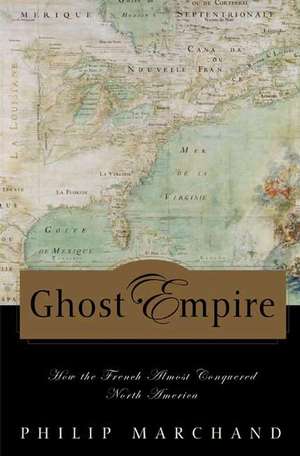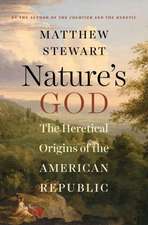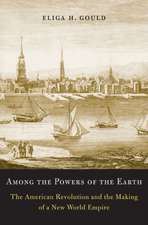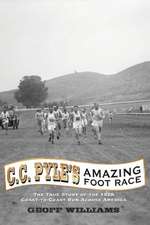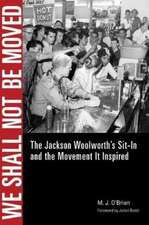Ghost Empire: How the French Almost Conquered North America
Autor Philip Marchanden Limba Engleză Hardback – 29 ian 2007 – vârsta până la 17 ani
Preț: 329.71 lei
Preț vechi: 485.58 lei
-32% Nou
Puncte Express: 495
Preț estimativ în valută:
63.09€ • 66.05$ • 52.20£
63.09€ • 66.05$ • 52.20£
Carte tipărită la comandă
Livrare economică 07-21 aprilie
Preluare comenzi: 021 569.72.76
Specificații
ISBN-13: 9780275994174
ISBN-10: 0275994171
Pagini: 480
Dimensiuni: 156 x 235 x 39 mm
Greutate: 0.89 kg
Editura: Bloomsbury Publishing
Colecția Praeger
Locul publicării:New York, United States
ISBN-10: 0275994171
Pagini: 480
Dimensiuni: 156 x 235 x 39 mm
Greutate: 0.89 kg
Editura: Bloomsbury Publishing
Colecția Praeger
Locul publicării:New York, United States
Notă biografică
Philip Marchand is the books columnist for the largest circulation newspaper in Canada, the Toronto Star.
Recenzii
Marchand's storytelling does remind readers that the footprints of La Salle and other French visitors and residents have all but vanished from what was once the French empire in North America. Recommended. Undergraduate and general collections.
Ghost Empire: How The French Almost Conquered North America is an outstanding survey which tells of explorer LaSalle, murdered by his own men but a key figure in claiming land for France in 1682. Had history not gone differently, a French-speaking empire might have extended a thousand miles beyond Quebec, Catholic in religion and strong in Native rights issues. In presenting the story of LaSalle's achievements and speculating on what could have been, an exciting alternative history is created which weaves past and present in a powerful account of conquest, culture and change. A top pick for both college-level American history collections and any general-interest public library strong in lively, thought-provoking American history surveys.
Marchand describes the 17th-century explorations of North America by Rene-Robert Cavelier, Sieur de La Salle, combined with his own travels tracing after the figure that, had he not been murdered by his own men in Texas in 1678, could have given birth to a French empire across North America. The figures encountered by La Salle in the 17th century and the figures encountered along La Salle's path some 300 years later by Marchand are used to explore how French America could have looked, had it come to pass.
French North America, a country that might have been but never materialized, inspired Marchand to take to the road and seek its traces. With his itinerary guided by the explorations of La Salle in the 1680s, Marchand combines various moods of writing in an original way. His structure is a straight-up travelogue to a dozen-plus sites of French colonial forts and settlements, starting in Texas, where La Salle came to grief in 1687, reverting to Montreal, and continuing through the Great Lakes and down the Mississippi River..[M]archand fits his commiseration with amateur historians and reenactors between layers of reflection on habitant culture, its Catholicism and its relations with Indians. Further deepening the philosophical mood are Marchand's ruminations on his Catholic faith and his reconnection with his French Canadian ancestry. If it's possible for people to internalize their history, then here is an inveigling and thoughtful example from the book critic of the Toronto Star.
Ghost Empire: How The French Almost Conquered North America is an outstanding survey which tells of explorer LaSalle, murdered by his own men but a key figure in claiming land for France in 1682. Had history not gone differently, a French-speaking empire might have extended a thousand miles beyond Quebec, Catholic in religion and strong in Native rights issues. In presenting the story of LaSalle's achievements and speculating on what could have been, an exciting alternative history is created which weaves past and present in a powerful account of conquest, culture and change. A top pick for both college-level American history collections and any general-interest public library strong in lively, thought-provoking American history surveys.
Marchand describes the 17th-century explorations of North America by Rene-Robert Cavelier, Sieur de La Salle, combined with his own travels tracing after the figure that, had he not been murdered by his own men in Texas in 1678, could have given birth to a French empire across North America. The figures encountered by La Salle in the 17th century and the figures encountered along La Salle's path some 300 years later by Marchand are used to explore how French America could have looked, had it come to pass.
French North America, a country that might have been but never materialized, inspired Marchand to take to the road and seek its traces. With his itinerary guided by the explorations of La Salle in the 1680s, Marchand combines various moods of writing in an original way. His structure is a straight-up travelogue to a dozen-plus sites of French colonial forts and settlements, starting in Texas, where La Salle came to grief in 1687, reverting to Montreal, and continuing through the Great Lakes and down the Mississippi River..[M]archand fits his commiseration with amateur historians and reenactors between layers of reflection on habitant culture, its Catholicism and its relations with Indians. Further deepening the philosophical mood are Marchand's ruminations on his Catholic faith and his reconnection with his French Canadian ancestry. If it's possible for people to internalize their history, then here is an inveigling and thoughtful example from the book critic of the Toronto Star.
